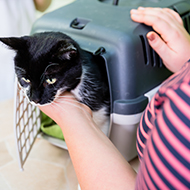
The organisation has accredited 2570 clinics.
International Society of Feline Medicine (ISFM), the veterinary division of International Cat Care, is celebrating 10 years of its Cat Friendly Clinic (CFC) accreditation programme.
The programme, designed to make veterinary clinics less stressful for cats, started as a competition to encourage veterinary professionals to think about the cat experience in their own clinics. A decade on, many of the CFC programme's ideas have become mainstream, and influenced feline veterinary care worldwide.
Over the past decade, ISFM has accredited 2570 CFCs in 44 countries, with an additional 644 cat friendly practices listed in North and South America by the American Association of Feline Practitioners, who licence the programme from iCatCare.
To mark the occasion, ISFM ran another competition to showcase the ways in which cat-friendly clinics have made their veterinary practices more cat-friendly, and at the end of 2021, clinics were asked to submit short videos of their changes.
ISFM has chosen three finalists in each category:
Physical change to the clinic
• Amitago Clinica Felina for the redevelopment of their whole clinic (Spain)
• Lumbry Park Veterinary Specialists for their use of bespoke cat beds (UK)
• Orchid Veterinary Surgery for their cat-only upstairs area (UK)
Procedural change to ways of working with cats
• Ferndown Family Vets for their kitten visits (UK)
• DAP De Witte Raaf for their use of a lick mat (Belgium)
• Tierarztpraxis Jana Wendt for their use of olfactory distraction techniques (Germany)
The winners of each category will be announced on 29 April at iCatCare's 'Being Cat Friendly' event in London, and the winners will receive two tickets to ISFM Congress.
Further information on ISFM's CFC programme can be found here.



 The Veterinary Medicines Directorate (VMD) is inviting applications from veterinary students to attend a one-week extramural studies (EMS) placement in July 2026.
The Veterinary Medicines Directorate (VMD) is inviting applications from veterinary students to attend a one-week extramural studies (EMS) placement in July 2026.